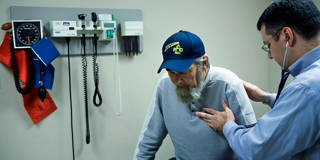Angus Deaton
Says More…
PS: In Deaths of Despair and the Future of Capitalism, you and Anne Case exposed an epidemic of deaths by suicide, accidental drug overdose, and alcohol-related liver disease among less-educated Americans, rooted in the “slow destruction of working-class life since 1970.” An “absurdly expensive” health-care system, financed largely by employer-based insurance, significantly exacerbates this trend – not least by pricing the least skilled out of good jobs. At the Back to Health event, you will participate in a panel on the economics of universal health care. How important is health-care reform to America’s long-term economic prospects, and which changes should come first?
Angus Deaton: I think that health-care reform is enormously important to America’s long-term economic and social prospects. We are spending $1 trillion more on health care per year than we ought to be. This burden is reducing wages and eliminating good jobs for less-educated Americans. It is also limiting the prospects for future federal spending, though the pandemic has temporarily redirected attention to the costs of tackling COVID-19. And it is hurting state governments: the mounting costs of Medicaid are limiting US states’ ability to provide other services, particularly education. For example, states used to provide much more ample funding to public universities, ensuring that a high-quality education could be had at relatively low cost.
The US cannot tackle its health-care problem without cost-control measures. The problem is that those who benefit from keeping health-care costs exorbitant have undue influence over certain political forces. This makes real progress highly unlikely, even impossible.
The introduction of a British-style National Institute for Health and Care Excellence would help. For example, it would prevent a repeat of the Food and Drug Administration’s recent decision to provide accelerated approval to an Alzheimer’s drug of doubtful efficacy, which will be a financial boon for its makers: it costs around $100,000 per year per patient, several million of whom are likely to demand it.
A public option would also go a long way toward addressing America’s health-care problem, but it faces strong political opposition. It is disappointing that President Joe Biden’s administration has not committed to tackling this problem. I suspect they have decided that success is not possible.

PS: At the event, your panel will consider how the principle of universal health coverage can be integrated into the broader economic-development strategy for low- and middle-income countries. While you support foreign aid “that builds global public goods or that does work on health,” you’ve also lamented the “habit of pushing First World health agendas onto poor countries,” and warned against excessive aid. In line with your Nobel Prize-winning research, how can consumption data or other economic indicators help developing countries’ investments in public health avoid these pitfalls?
AD: I believe that everyone in the world, wherever they live, should have access to quality and affordable health care. Yet, given that there is essentially zero chance of achieving universal health coverage in the US in the foreseeable future, we Americans are uniquely ill-equipped to give advice on how to deliver it.
Providing health care is difficult everywhere. Markets have fundamental problems delivering in this area, including in the provision of health insurance. Governments have different but equally fundamental problems doing so. The ideal mix of state and market will be different in different places. Foreign aid has often been successful in helping with vertical health measures – vaccinations, vector control, clean water – but not in providing routine health care.
It is up to governments to make intelligent decisions about health-care provision that reflect the needs, traditions, and desires of their citizens. To this end, they must measure the amount their citizens spend on health care, and in what kinds of facilities. They also need to keep tabs on the performance of public and private health providers, particularly on whether staff turn up for work, and on the quality of care that they provide. Governments need to decide which state-provided services will do the most good based on real information on performance, and not be bound by external mantras that demand the provision of one kind of service over another. Finally, they need to avoid any health-care or health-insurance system that is designed to benefit providers at the expense of everyone else.





